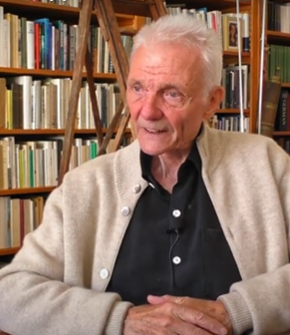Michael Oppitz

- Profession: Ethnographer
- Country of Origin: Germany
- Date of Birth: 1942
Born in Silesia, a Polish-Czech-German border, Michael Oppitz was raised in Geneva and Cologne. He did courses in Sinology and Anthropology at Bonn and Berkeley before beginning his study of Ethnology and Sociology at the University of Cologne. He first came to Nepal in 1965 after receiving an offer to work as a census taker in a programme run by the Association for Comparative Alpine Research funded by the Thyssen Foundation.
“Right at the outset of my statistical forays through Solukhumbu in Summer 1965 I stumbled across a number of manuscripts, historical documents, that enabled a picture to be drawn of the history of the Sherpa clans and their migrations, past and present. This discovery at the age of 22 turned me into an author – into the ethnographer that I have remained.”
He published his first book on the history and social order of the Sherpa (Geschichte und Sozialordnung der Sherpa) in 1968. He recalls Nepal entering his sights rather suddenly during his early visits when he came in contact with the wide variety of people and local forms of religion that distinguished the Himalayas from other parts of the world.
“This cultural richness – in every valley another picture, another facet – was also expressed in the great variety in the interplay between landscape and architecture: here the elastic bamboo huts of the Rai, more woven than built, there the tiered, flat-roofed houses piled up the slopes of the Magar villages; here the massive block houses in upper Kali Gandaki, sometimes decorated with red, black and yellow paint stripes, there the hermitages of the Buddhist monks pinned to the cliffs; here the browns of the brick alleyways and pagodas in the Newar towns, there the white cubic buildings amid the fluttering rice terraces. I read about all of this with a thrill – as one proof after another of the genius of the indigenous master builders without name.”
In the mid-1970s Oppitz returned to Nepal to work in Taka, a village of the Western Magar in the district of Rukum, where he directed the four-hour film Shamans of the Blind Country (Schamanen im Blinden Land) in 1980 with a corresponding photo-book of the same title comprising black-and-white photographic and written documentation, which in 2021 was published in an expanded English-language edition. He also worked on a comprehensive account of the Magar society in 1991, “Onkels Tochter, keine sonst: Heiratsbundnis und Denkweise in einer Lokalkultur im Himalaya,” tracing the echoes of the marriage system in their culture.
From 1992 to 2008 he was professor at the University of Zurich, Switzerland and director of Zurich’s Ethnographic Museum. Since the 1960s he has made numerous field research trips to the Himalayas. He is the author of numerous publications on anthropological and ethnological topics and has made several short films.
N/A
N/A
N/A
N/A